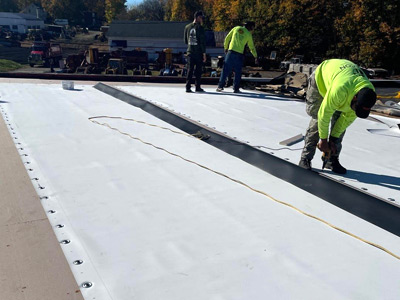If you have ever wondered what TPO roofing is, what it stands for, what are the benefits of TPO roofing material, and other helpful information about TPO roofing, then this blog post is for you. Therefore, keep reading and find out more about one of the best commercial single-ply roofing systems on the roofing market.
What Is TPO Roofing?
TPO roofing stands for a roof covered with TPO material, i.e., one of the single-ply roofing systems that are placed on the roof to protect it from weather elements. TPO consists of a layer of synthetic materials combined with a layer of reinforcing material (called scrim) and is used for covering flat roofs. Besides protection, TPO roofing is known as a roof that helps save energy costs due to its high reflectivity.
What Does TPO Stand For?
TPO is an abbreviation for Thermoplastic Polyolefin, which is a type of thermoplastic material that is made up of a layer of synthetic materials and a layer of reinforcing material (known as scrim) that are combined together.
Is TPO a Single-Ply Roofing System?
Yes, TPO is a single-ply roofing system, along with EPDM and PVC, two other types of single-ply roofing systems. All three membrane materials belong to two basic types of single-ply systems: thermoset and thermoplastic.
Thermosets are materials made from synthetic rubber, into which polymers are incorporated to enhance their UV resistance, alter their color, or boost their reflective properties. In contrast, thermoplastics are composed of base materials, such as thermoplastics and polyvinyls, which determine their properties.
Additional polymers may also be added to thermoplastics and thermosets to enhance their strength, resilience, color, and reflectivity.
As we mentioned, there are three types of single-ply roofing systems based on these two materials: TPO, EPDM, and PVC. Since we promised to explain all information regarding TPO thoroughly, here are the key differences between TPO and the other two single-ply roofing systems.
What Are the Differences Between TPO, EPDM, and PVC Commercial Roofing Systems?
Instead of starting with TPO, let’s begin with PVC, the last material on the list, and then move towards TPO while highlighting its differences from the other two materials.
PVC Single-Ply Roofing Membrane
PVC, or polyvinyl chloride, is a thermoplastic material first presented during the 1960s and is mainly used for flat and low-slope roofs. It is manufactured in rolls, and it can be rolled and attached to a roof through two processes: chemically or mechanically. The application process depends on the roofing structure and roof slope. Also, PVC is known for its energy efficiency due to its highly reflective surface, which helps deflect heat and saves up to 50 % on cooling costs for the building.
Additionally, the seams of PVC membranes are heat-fused with a welder, which creates a seamless and cohesive unit. Finally, when properly maintained, PVC membrane systems can last around 20 years, although environmental factors and hazards can influence the actual lifespan.
EPDM Single-Ply Roofing Membrane
Unlike PVC, EPDM is a thermoset material produced from synthetic rubber compounds. It was also presented to the market during the 1960s and is known for its many benefits. Some of those benefits are its strength, flexibility, and longevity since EPDM membranes have a lifespan of around 25 years. Also, unlike PVC, which can be attached chemically and mechanically, EPDM attachment to a roofing structure is usually mechanical. It means that anchors and screws are physically connected, while seams are usually fused with seam tape.
TPO Single-Ply Roofing Membrane
Just like PVC, TPO is also a thermoplastic material. However, it is a newer material; therefore, unlike EPDM and PVC, which have been in use since the 1960s, TPO was introduced a little later and as a combination of the best features of EPDM and PVC. The benefits of TPO roofing are tremendous; here are some of them.
Benefits of TPO Roofing Installation
Cost – even though the cost of single-ply roofing systems depends on different factors, it is known that TPO is less expensive than PVC and EPDM.
Longevity – TPO has an average lifespan of around 20 years.
Reflectivity and Energy efficiency – TPO is known for its high reflectivity, which reduces solar heat on the roof and increases energy efficiency.
Resistance – TPO is quite a solid and durable roofing material, resistant to corrosion and mold. Furthermore, it is also resistant to fire and is rated as a Class A fire-resistant roofing material.
Adherence – TPO can be chemically adhered to the existing roofing system or structure with the use of adhesives like glue to form a strong bond and resist lift risk, or it can be mechanically attached, like EPDM.
Seams – TPO materials’ characteristic allows seams to be heat-fused together. Done correctly, this results in a virtually seamless roofing system.
How to Install TPO Roofing Membrane?
Installation of the TPO roofing system requires knowledge, expertise, and experience since the entire process of the TPO roofing membrane is quite demanding and challenging, especially during the installation process around chimneys and vents.
Prior to installation, the surface of the roof is cleaned and prepared. The roofing material is strategically placed to aid in the process and also to distribute the weight evenly. The reason is simple. Putting all the roofing materials in one spot is not recommended, as their weight could potentially damage the roof’s surface.
Once the preparation is complete, the installation begins with the insulation material placement. Following this, the TPO membrane and related elements are installed with the proper tools to ensure the appropriate placement of the TPO membrane.
As we mentioned before, the installation of TPO requires outstanding craftsmanship and attention to detail, so if your commercial roof needs a TPO roofing installation, make sure that you have found a reliable and experienced roofing company, a company like MK Roofing.
Who to Call for TPO Roofing Installation?
MK Roofing is a commercial roofing company with over 30 years of roofing experience. We specialize in commercial roof repair and roof replacement, along with the installation of all kinds of commercial roof coatings like spray foam coating, commercial rubber roofing, and single-ply roofing systems, including EPDM, PVC, and TPO roofing installation.
Since we are known for our exceptional professionalism and integrity, we are the first choice for many business owners in New Jersey for commercial roofing services.
Therefore, if your commercial roof requires TPO roofing installation or you have noticed some other roofing issues you would like to address, you can count on MK Roofing.
Contact us today at 908-323-9686, and schedule an appointment for a roof inspection, FREE of charge.

